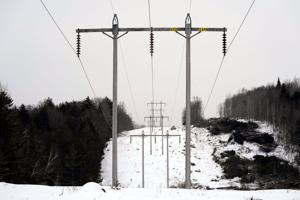Maine weighs ban on ballot spending by foreign corporations

(The Center Square) – A key legislative committee is weighing a proposal that would ban foreign corporations from spending money on ballot questions, a move aimed squarely at Hydro-Quebec’s efforts to sway Maine voters on a controversial hydropower project.
On Thursday, the Legislature’s Committee on Veterans and Legal Affairs will hold a work session to consider and possibly vote on several bills that would limit or prohibit companies that are either wholly or partially foreign owned from spending money on political advertising on referendums.
Supporters of the restrictions say they are needed to keep foreigners from sticking their noses in Maine’s business.
Rep. Nicole Grohoski, D-Ellsworth, says the state needs to close the “shocking loophole” that allows foreign corporations to pour money into campaigns aimed at swaying Maine voters on important public policy decisions.
“Our laws do not allow these governments to contribute money to the elections of lawmakers, so it is astounding that we allow them to contribute to directly influence the making of laws,” she said in recent testimony in support of one of the proposals.
But opponents say the bills are unfairly aimed at cutting off a sizable source of funding for supporters of Central Maine Power’s New England Clean Energy Connect project.
Hydro-Quebec’s CEO Sophie Brochu said the hydropower transmission project will create jobs, boost the green economy and deliver clean hydropower at a discounted cost to Mainers. It’s a message tha would be “silenced” if the lawmakers approve the ban, she said, and the company will “defend” its right to be a part of the discussion.
“We are troubled by this effort to suppress our right to speak and the right of our Maine neighbors to receive accurate and specific information from us,” she said in testimony.
Brochu called on lawmakers to reject all of the proposals “so that we are not silenced while our market competitors – the well-funded fossil fuel corporations who have helped to fund the referendum initiative – will move forward without the same restrictions.”
But voting rights advocates say the restrictions are needed to ensure the integrity of the democratic system.
“When the money comes from unaccountable sources, or when the amount of money from one source is so large that it warps the campaign dialogue, it has an undemocratic effect that needs to be corrected by policymakers,” John Brautigam, legal counsel for Maine Citizens for Clean Elections, said in submitted testimony in support of the bills.
Central Maine Power’s $1 billion NECEC calls for providing up to 1,200 megawatts of Canadian hydropower to the New England region. The energy consortium is under contract with Massachusetts to deliver a sizable amount of green power along a 145-mile transmission line that would run through Maine.
Backers say the project will create jobs, help green the regional power grid and reduce greenhouse gas emissions that scientists say are contributing to a warming planet.
Opponents say it will carve through scenic swaths of forest in the North Maine Woods, damaging the environment and leading to a loss of jobs and recreational tourism.
Both sides have waged a costly and bitter public relations war for several years over the details of the project, and whether it will negatively impact the state and its ratepayers.
Meanwhile, opponents are inching towards the November ballot with a referendum that would stop the project. Political observers expect a crush of spending on advertising to sway voters.
Sandi Howard, who heads the No CMP Corridor PAC, said polling shows a majority of the public opposes the project despite millions of dollars spent by the energy companies.
“But the larger issue is that a foreign-owned corporation and its government owner should not be able to influence a vote in Maine,” Howard wrote in testimony to the committee. “As you know by their aggressive lobbying efforts and statewide media campaign, Hydro-Quebec has exposed a weakness in Maine’s election law that needs to be fixed.”
Disclaimer: This content is distributed by The Center Square


